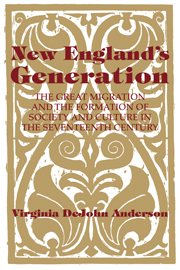 New England's Generation
New England's Generation 2 - Passage
Published online by Cambridge University Press: 24 January 2011
Summary
After his safe arrival at Salem early in the summer of 1629, the Reverend Francis Higginson concluded his journal of the voyage with a summary of five “remarkeable things” concerning his recent trip. “First,” he noted, “through God's blessing our passage was short and speedy,” accomplished in just forty-five days. Second, the voyage was “comfortable and easie for the most part”; Higginson and his fellow passengers on the Talbot encountered few “stormie and rough seas, saving one night only.” Third, most of the emigrants remained healthy during their weeks at sea, avoiding “the great contagion of the scurvy and other maledictions, which in other passages to other places had taken away the lives of many.” One seaman and two children – including the minister's own daughter – had died, but the former had been a “wicked fellow that scorned at fasting and prayers,” and the two children had both been “very sickly … and not likely to have lived long, if they had not gone to sea.” Fourth, Higginson found the voyage to be “both pleasurable and profitable,” for he and the other passengers were able to appreciate God's glory more fully as they beheld strange fish and other “wonders of the Lord in the deepe waters” that they had never before seen. Finally, Higginson marveled at the fact that “we had a pious and christianlike passage; for I suppose passengers shall seldom find a company of more religious, honest, and kynd seamen than we had.”
- Type
- Chapter
- Information
- New England's GenerationThe Great Migration and the Formation of Society and Culture in the Seventeenth Century, pp. 47 - 88Publisher: Cambridge University PressPrint publication year: 1991
